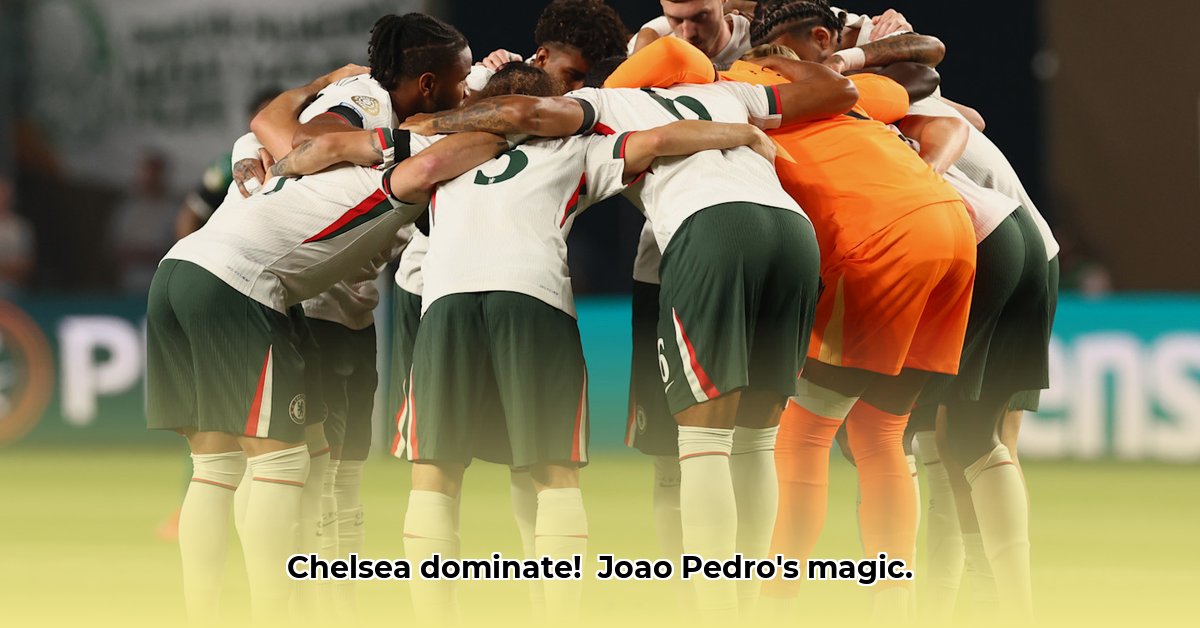
Chelsea secured their place in the Club World Cup final with a convincing 2-0 victory over Fluminense, thanks largely to a dazzling brace from summer signing Joao Pedro. The new arrival showcased his talent, proving a shrewd addition to the Blues' squad. The match was a fascinating tactical battle, with Chelsea's dominance in midfield ultimately proving decisive.
A Dominant Display from Chelsea
From the first whistle, Chelsea controlled the tempo, showcasing crisp passing and incisive movement. Their midfield, a well-oiled machine, dictated the play, frustrating Fluminense's attempts to build attacks. While Fluminense's defence, marshalled expertly by the veteran Thiago Silva, offered stubborn resistance, Chelsea's superior firepower eventually told. The game wasn’t without its challenges; Fluminense created a few dangerous moments, testing Chelsea's backline. But, ultimately, Chelsea's quality shone through. Did their midfield control surprise anyone? It certainly showcased their strength.
Joao Pedro's Star Turn
Joao Pedro's performance was nothing short of exceptional. His two goals, both showcasing his clinical finishing and intelligent movement, perfectly encapsulated his impact on the game. His first goal, a beautifully-worked team effort, was a testament to Chelsea's cohesive attacking play. His second strike, a decisive finish late in the game, sealed the victory and cemented his status as the man of the match. The question isn't if he's worth the investment, but how many more goals will he score this season?
Tactical Battles and Key Moments
Chelsea's possession-based style contrasted markedly with Fluminense's counter-attacking approach. Chelsea patiently built attacks, creating numerous chances, while Fluminense looked to exploit spaces on the break. This tactical battle added to the match's excitement. Key moments included Joao Pedro's two goals, a remarkable save by the Chelsea goalkeeper, and a late injury to Moises Caicedo which cast a shadow over Chelsea's triumph. This injury highlights the precarious nature of even the most dominant performances.
Impact of Injuries and Suspensions
The late injury to Moises Caicedo is a concern for Chelsea, potentially impacting their starting line-up and tactical approach for the final. The extent of the injury is yet to be determined. Both teams also had to manage suspensions, affecting their tactical plans and squad selections throughout the match. How will Chelsea adapt without Caicedo?
Post-Match Reactions and Looking Ahead
(Space for post-match quotes from managers or players – if available)
Chelsea head into the final brimming with confidence, despite Caicedo's injury. They’ll need to demonstrate tactical flexibility to adapt to his potential absence. For Fluminense, the defeat, while disappointing, provides valuable lessons and opportunities for growth. Their resilient performance, despite the loss, will serve as a strong foundation for future success. The match showcased the high calibre of football and contrasting tactical approaches we have come to expect from these teams.
Thiago Silva's Enduring Influence on Fluminense
Thiago Silva's presence on the Fluminense team was undeniable, even in defeat. His leadership both on and off the pitch significantly impacted their performance throughout the tournament. He orchestrated the defence, guided younger players, and inspired his team through powerful emotional leadership and pre-match speeches that reinforced their shared ambition. But despite his considerable influence, Chelsea's superior resources and strategy ultimately decided the outcome. His experience and influence, however, left an undeniable mark on Fluminense.
Pivotal Points:
- Joao Pedro's two goals were instrumental in securing Chelsea's victory.
- Chelsea's midfield dominance controlled the flow of the game.
- Moises Caicedo's injury adds a significant challenge for Chelsea ahead of the final.